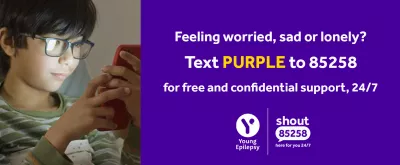This information is for people affected by or concerned about emotional disorders as a co-occurring condition with epilepsy. On this page we talk about the different types of emotional disorders and their risk factors. We also cover the different ways you can help your child manage these disorders so they feel included, can take part in the same activities as their friends and enjoy a fulfilling social life.
Use this page as a general guide and speak to a health professional for more information and support.
On this page
What are the different types of emotional disorders?
Children and young people with epilepsy might experience different types of emotional disorders, including psychological and social issues.
Some common issues can include:
- bullying
- fear of seizures and injury
- dependence on adults for care
- difficulty coping with anti-seizure medication side effects
- having a poor relationship with parents, siblings and friends
- stigma and social isolation
- exclusion from activities.
People with epilepsy who experience these types of psychological and social issues, may as a result experience some of the following problems:
- anxiety
- withdrawal from friends or not doing the things they normally enjoy, such as hobbies or social activities
- lack of independence
- lack of confidence
- depression
- behavioural difficulties
- other psychiatric conditions
- stopping medication against the advice of a health professional.
However, there is no clear link between the issues listed above and the possible health problems that may happen as a result. Remember that all children and young people with epilepsy are different and how epilepsy affects someone emotionally and socially will vary from person to person. It may also depend on the child’s type and frequency of seizures, their age, stage of development and level of confidence, as well as the people close to them.
Risk factors for emotional disorders
Some of the most common co-occurring conditions with epilepsy are emotional disorders, such as depression and anxiety.
These are some of the risk factors that may increase the chances of a child with epilepsy developing an emotional disorder:
- reaching adolescence
- having poor seizure control
- taking more than one anti-seizure medication
- side effects of anti-seizure medications
- temporal and frontal lobe epilepsy
- a family history of emotional disorders
- other medical conditions, especially those associated with epilepsy
- seizures beginning at a younger age
- being female
- social problems
- psychological and psychosocial issues caused by having epilepsy
How can I help my child with any worries they may have?
Having epilepsy can be challenging, especially as a child or young person. However, there are some things you can do to help support them emotionally.
Set aside a regular time to discuss how their day or week has gone
It may be helpful to involve the whole family in the conversation or you may prefer to have some individual time with your child who has epilepsy. Even if they do not share their own concerns or worries, they’ll learn that it’s okay to talk about problems and have open conversations with people they trust.
Introduce a feelings diary
Some children may find it helpful to write down what they’re thinking and feeling. Encourage them to keep a note of any concerns or worries they may have. If they’re happy to share what they’ve written, set aside some regular time to work through their worries.
Identify adults who they can talk to about their worries
It may be helpful for your child to know exactly who they can go to if they have any concerns or worries. They may want to have different people to talk to for different problems, for example, their teacher for any problems at school, or a parent for any problems at home. Knowing who they can trust will help them feel more confident to talk about their worries.
Help them find their own solutions
Try not to always find an immediate ‘fix’ to their problems or worries. Sometimes, talking about what’s worrying them can help them find their own solutions. Ask them what they think could be done to address their problems and if they’d like you to help.
Learning about epilepsy
It can be helpful if both you and your child fully understand about epilepsy and the impact it can have on your lives. It’s also a good idea for the whole family and close friends to know about the condition. This will help them understand what you’re going through and may mean that they can support you better, especially during more difficult times.
Your child will then feel they’re surrounded by people who know about seizures and what to do if they have one.
Educating everyone involved in caring for your child, as well as their friends at school, is important to raise awareness, reduce stigma and make sure your child is included in all activities. At Young Epilepsy, we can provide training to school staff and pupils, using a range of resources.
Encouraging your child to take control of their health
When your child’s ready, encourage them to take control of their health. This is called self-management. This will help them to accept their diagnosis and prepare them for their transition to adult services.
Being proactive and self-managing your health can include:
- keeping a seizure diary and record of any side effects from medications
- asking questions at their appointments
- setting reminders to take their medications.
Helping your child to communicate with other young people with epilepsy
Being in touch with other young people with epilepsy can encourage your child to be more open about their condition, reduce feelings of isolation and give them positive social experiences.
As we continue to campaign to raise awareness of the links between mental health and epilepsy, we have also created a Wellbeing Space, a dedicated space for older children and young people. The space includes information and support, as well as young people’s stories and advice on topics such as anxiety, isolation, depression, self-worth and feeling overwhelmed.
You may also find it helpful for your child to join an in-person or online support group, so they can connect with others who understand what they’re going through. They can join our virtual youth clubs. You can also join a group specifically for parents and carers of children with epilepsy. Sharing your experiences with others and exchanging tips and advice can be helpful and reassuring.
Supporting your child to take part in activities and have a fulfilling social life
As a parent or carer, you might find it difficult to encourage your child to take part in activities and have a fulfilling social life. This can be especially hard if they have epilepsy and other co-occurring conditions, such as emotional disorders.
Your child may need support and encouragement to overcome their worries. At times, this can feel overwhelming for parents and carers to manage, especially if you’re already caring practically for your child too.
But it’s important that your child has a fulfilling social life and takes part in activities that they enjoy. This will help to improve their social relationships, reduce their sense of isolation and encourage openness about their epilepsy. There is also some research which shows that seizures are less likely to happen when taking part in enjoyable mental or physical activities, such as sport.
Getting specialist help
If your child is affected by emotional issues which are having a significant impact on their day-to-day life, they may need some professional help.
You can get advice from your child’s school, GP or epilepsy specialist nurse. Your local children and young people’s mental health services (CYPMHS) can also provide counselling and specialist psychological support.
Remember, children show emotional distress in different ways – some may become withdrawn, while others may become irritable and have temper outbursts.
If your child shows any signs of emotional distress, discuss it with their healthcare team as soon as you can so they can get the right treatments and support in place to reduce the long-term impact.
Also, remember that the Wellbeing Space has lots of useful information, top tips and coping strategies to support young people with epilepsy to look after their emotional and mental health.
Find out about treatment and support of co-occurring conditions with epilepsy.

Other useful organisations
Mind
An organisation that supports people with mental health conditions, including anxiety and depression.

